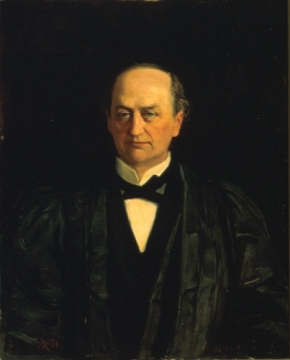You are here
Circuit Court Opinions:
Associate Justice David Josiah Brewer, Ames v. Union Pacific Railway Co. (1894)

Ames v. Union Pacific Railway Co., 64 F. 165 (C.C.D. Neb. 1894) [Eighth Circuit], affirmed, 169 U.S. 466 (1898)
The ability of state legislatures to regulate intrastate railroad rates was a matter of great controversy in the late nineteenth and early twentieth centuries. In 1893, Nebraska passed a law imposing maximum rates for the transportation of freight within the state. Shareholders of several railroad companies sued to challenge the law. Although there were many legal issues presented, the most important in Justice Brewer’s view was whether the rates Nebraska had prescribed were so unreasonable as to justify the court in enjoining their enforcement. “No more difficult problem can be presented than this,” he wrote.
Brewer recognized that “[p]roperty invested in railroads is as much protected from public appropriation as any other. If taken for public use, its value must be paid for.… The value of the property cannot be destroyed by legislation depriving the owner of adequate compensation. The power which the legislature has is only to prescribe reasonable rates, not any rates.” He admitted, however, that there was no established test to determine what was reasonable in this context and that no uniform rule would likely be adequate in all cases.
In trying to determine the impact of the rate reduction on the railroads’ business, Brewer relied on tables provided by the secretary of the state board of transportation. In analyzing the data, he concluded that if the Nebraska law “had been in force during the year ending June 30, 1892, not a single one of these roads would have earned a dollar from the transportation of local freight.”
Despite his reluctance to interfere in the judgment of a state legislature, Brewer’s calculations convinced him that the law “deprives these property owners of all chances to make profit which result from private control of business, and compels them to pay out of their pockets all the losses which result from the enforcement of an absolute system.” He therefore issued an order staying enforcement of the Nebraska rates.
The Supreme Court affirmed Brewer’s decision in Smyth v. Ames (1898). In an opinion by Justice John Marshall Harlan, the Court agreed that railroad rates set by a state would, if they did not provide the carrier with just compensation, violate the Fourteenth Amendment by depriving the railroad of its property without due process of law and denying it the equal protection of the laws. As an aside, Harlan asserted that regulatory commissions composed of experts would be better qualified than state legislatures to set rates that would be fair to both the public and the railroads. Many states created such commissions in the ensuing years. Railroads continued to bring Fourteenth Amendment challenges to state rate regulations, however, claiming that rates were set so low as to amount to “confiscation” of their property. Federal courts frequently enjoined the enforcement of railroad rates on these grounds.
